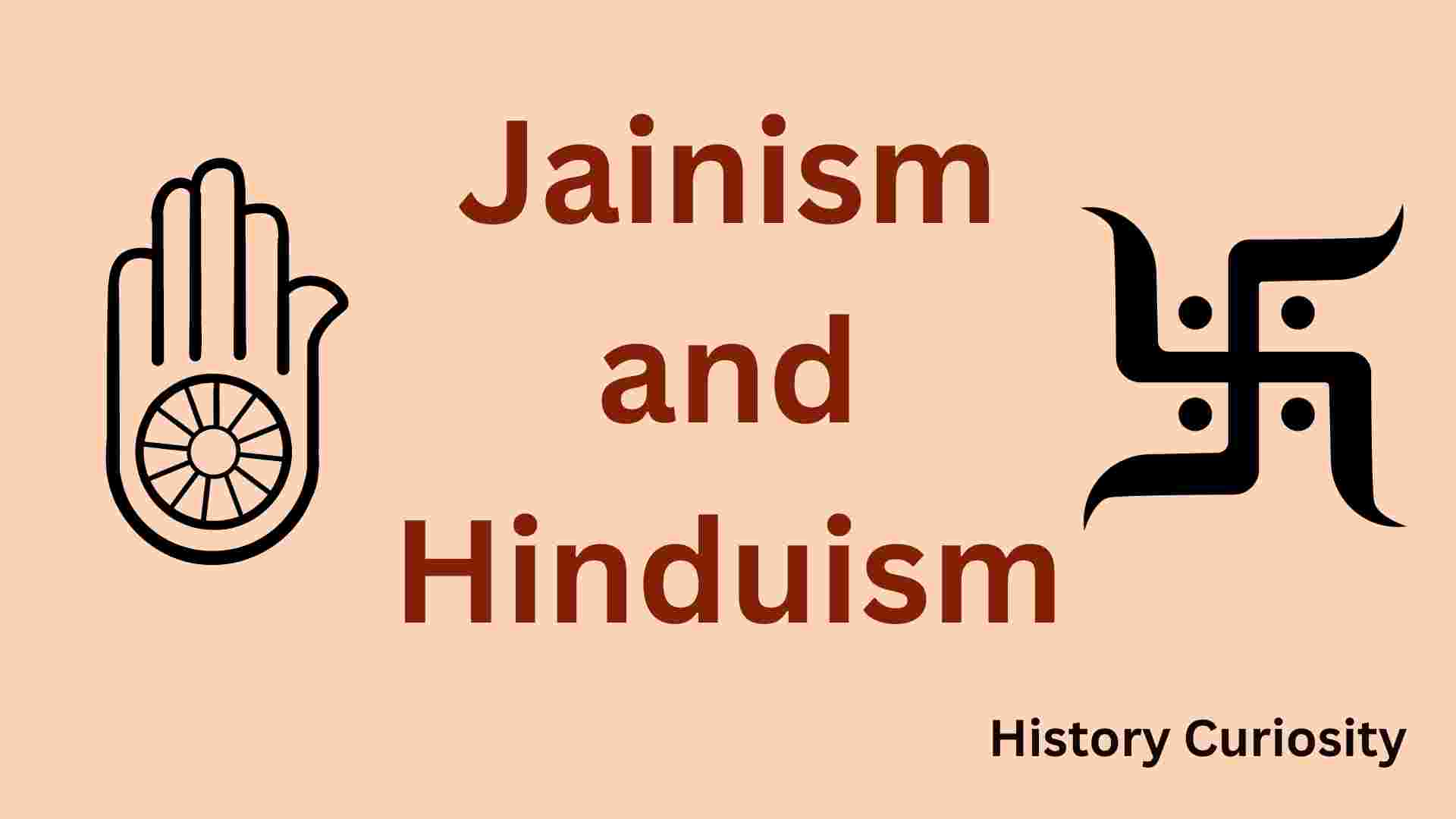differences and similarities between Jainism And Hinduism. Explore the deep beliefs and practices of Jainism and Hinduism in our comprehensive guide. Delve into the spiritual and philosophical aspects of these ancient Indian religions, understanding their principles, rituals, and cultural significance.
Discover the basic principles, sacred texts, and role of karma and reincarnation in Jainism. Uncover the rich tapestry of Hinduism, including its diverse deities, rituals, and concept of dharma. Compare and contrast the two faiths, gaining insight into their unique worldviews while appreciating the commonalities that have shaped Indian spirituality for centuries. Whether you’re looking for a deeper understanding of these religions or their influence on culture and society, our guide offers valuable insights into the spiritual richness of Jainism and Hinduism.
differences and similarities between Jainism And Hinduism
| Historical Facts | Jainism And Hinduism |
| Originated | The third-largest religion |
| The third-largest religion | Hindu |
| Jainism | Jain |
| Last Tirthankara of Jainism | The third-largest religion |
| The Third-largest religion | Hinduism |
Introduction
Hinduism and Jainism are two ancient religions that originated in India. There are several differences and similarities between the two religions. The gods, temples, rituals, and various other components of Hinduism differ from those of Jainism. Many scholars often believe that the Jain religion is older than Hinduism.
This is because the concepts of Hinduism were later constructed by the colonizers.
Jainism
Jainism is a philosophical and religious system with about two million followers known as Jainism, found mainly in India. The reason for its establishment around the 6th century BC was to protest against the practices of Hinduism.
The followers of Jainism were called Jains
The word jinn comes from the term jinn, which refers to someone who has already taken over everything within himself, including certain emotions such as anger, affection, lust, and pride, and in return attains the virtuous and limitless knowledge called Kevala Jnana.
the faith of the Jains
Jains believe that the universe is divided into two autonomous permanent concepts, which they call the categories of “life” and “non-life”. He also argues that humans can only attain a state of perfection through the disciplines of asceticism, charity, and monasticism. Jains do not believe in gods or God as the creator of heaven and earth.
They only believe that a tirthankara has a superior position in their doctrine.
Deva, as Hemachandra mentioned, contained his inner desires, and this responsibility was exercised only by the Tirthankara.
The last in the line of Jainism
Mahavira, or Jina, was considered the final historical figure in the succession of the twenty-four original saints of Jainism. He taught the philosophy of ahimsa, which holds that all forms of life are sacred and advocates nonviolence. Along with this guiding principle are the two equally important doctrines of aparigraha, meaning non-possession, and anekanta, meaning non-absolutism.
Decline of Jainism
There is a legend that says that when the Hindu philosopher Adi Sankaracarya tried to restore the Vedic religion in the 8th century, 8000 Jain monks were massacred at the behest of King Koon Pandiyan. During this time, the doctrine of Advaita began to emerge alongside Vaishnavism and Shaivism. Jain temples like Trikkur Mahadeva Temple and Padmakshi Temple were also converted into Hindu temples, mostly in the South Indian region.
Hinduism
Hinduism is highly regarded as the main religion of India. After Christianity and Islam, it is listed as the third largest religion in the world in terms of the number of its followers. It is based on the sacred writings of the Vedas, which date back about 3000 years.
The Veda, which is the Sanskrit term for “knowledge,” consists of four kinds of compositions: the Samhita (hymns, chants, and prayers); Brahmins (prose); Aranyakas (meditation); and finally the Upanishads (the doctrine of the soul). The followers of Hinduism are known as Hindus.
Religion of Hinduism
Hindus believe in the doctrine of reincarnation and transmigration of the soul, which means that an individual can gradually be reborn into one of five classes of living beings, such as god, man, animal, hungry ghost, or even a denizen of hell, and it all depends on a person’s actions. Hindus believe in the idea of karma, which states that every human being is punished for the things they have done wrong and also blessed for the things they have done right, if not in the existing period, then in their rebirth.
With this, they strive to live higher in their existence to attain absorption in the qualities of Brahma. Hindus also believe in various village and tribal gods, namely Brahma (creator), Vishnu (protector), and Shiva (destroyer).
Hinduism has changed over the years
Hinduism began to develop between 800 and 500 BC due to the influence of its rival religions, Jainism and Buddhism. Significant changes occurred during this period, such as the creation of the caste system and the existence of enlightened Brahmins, often priests, as the supreme beings of society. Hinduism also included important subsidiary cults such as Shiva, Vishnu, Krishna, Shakti, and Matris.
The basic principle of Hinduism
The caste division, which they call Varnasrama Dharmas, is a fundamental precept cited in Hindu sacred texts. They believe in four important Varnas: Brahmana, Kshatriya, Vaisya, and Shudra; and also the four stages of human life, namely Brahmacharya (before marriage), Grihastha (after marriage), Vanaprastha (during forest retreat), and Sansaya (renunciation of worldly affairs). They believe that every individual should experience these stages in his life and that he must already improve at the Brahmacharya stage.
Similarities of Jainism and Hinduism
Jainism and Hinduism co-existed in the Dravidian-language country of Tamil in South India and Sri Lanka almost as early as the 2nd century BC. With this coexistence, the two have certain similarities that are also quite remarkable.
(i) Place of origin
Jainism and Hinduism originated in India. Both are known as the ancient religions of the Indians.
(ii) Existence of Atman or Soul
Both Jainism and Hinduism accept the existence of the Atman, or soul, and believe in its immortality. For them, the physical body may die, but the soul that inhabits it will live on, leading to reincarnation.
(iii) Concepts of karma, reincarnation and moksha
Both Jainism and Hinduism believe in karma (good and bad), reincarnation (continuous repetition of life after death), and moksha (liberation from the cycle of life and death). However, they differ in the meaning of these terms.
Differences between Jainism and Hinduism
The main differences between Hinduism and Jainism are:
(i) Number of Followers
Followers of Jainism have declined over the years, as some Jains now consider themselves Hindus. On the other hand, Hinduism is considered to be the third-largest religion in the world.
(ii) Belief in the Creator
Hindus believe in deities or gods such as Brahma, Vishnu, and Shiva. They believe that these gods created the universe, preserved it, and punished anyone who did something wrong in the universe. On the other hand, Jains do not believe in an almighty god or that the universe itself is more powerful than the laws that the universe has.
(iii) Animal sacrifices
Jains do not practice animal sacrifice because they value all forms of life through non-violence. Hindus, on the other hand, have allowed the concept of violence if it can help achieve enlightenment.
(iv) Concept of Moksha
Hindus believe that moksha, or liberation, occurs when a soul merges with its Universal Soul, leading to eternal residence in Vishnu’s Paradise, or Vaikunthdham, while Jains believe that moksha is just a quiet universe without activity, said to take place in Siddhabhoomi.
(v) Concept of Karma
For Hindus, karma is an invisible force that happens to people in the temporary world, or samsara, and depends on words, thoughts, and actions, whether good or bad, while for Jains, karma is a physical force that can exist everywhere in the universe, particles of which can stick to people’s souls depending on their actions.
(vi) Concept of space
In Jainism, the universe is more powerful than any creator, which is in contrast to the Hindu belief that the universe is made up of the creator Brahma.
(vii) Believe in non-violence
Hinduism believes in non-violence. However, the Mahabharata and Ramayana have shown that violence can be practiced where necessary. There is no violence in Jainism. He firmly believes in non-violence
(viii) Division
Hinduism has different classes and castes. Jainism has no division based on class or caste.
(ix) Diet
Some people follow a strict vegetarian diet, and some people consume a non-vegetarian diet. Jains are forbidden to have a non-vegetarian diet, including eggs.
(x) Human life
In Hinduism, a person has various duties in life, such as Brahmana, who is engaged in the study of the Veda; Kshatriya, who protects people; Vaishya, who attends to business matters; and Shudra, who serves the three above types of caste.
On the other hand, Jainism teaches individual conduct and spiritual justice through the virtue of non-possessiveness and the creation of a society free from exploitation, but it does not speak of the division and duties of men into different classes.
Conclusion
Jainism and Hinduism may have coexisted at one point in the history of the world’s religions, but they differ in their beliefs and conceptions of a creator, the universe, animal sacrifices, moksha or liberation, karma, and of course, the meaning of human life. One more thing is that the number of followers of Jainism has declined over the years, while Hinduism has become one of the world’s three largest religions after Christianity and Islam.
(FAQ) Questions and Answers about Jainism And Hinduism
Q-1. What is Jainism?
Ans. Jainism is an ancient Indian religion that emphasizes non-violence, truth, and spiritual development.
Q-2. Who was the founder of Jainism?
Ans. Jainism is traditionally attributed to Lord Mahavira, who is considered the 24th Tirthankara (spiritual teacher) in the Jain tradition.
Q-3. What is the central concept of Jainism?
Ans. Ahimsa, or non-violence, is the core principle of Jainism, promoting compassion for all living beings.
Q-4. Do Jains follow any specific dietary restrictions?
Ans. Yes, Jains follow a strict vegetarian diet and avoid foods like root vegetables that may harm living organisms when harvested.
Q-5. What are the key religious texts in Jainism?
Ans. The primary Jain scriptures are called Agamas, which contain the teachings of Lord Mahavira.
Q-6. What is Hinduism?
Ans. Hinduism is one of the world’s oldest religions, with diverse beliefs, practices, and traditions.
Q-7. Who is the founder of Hinduism?
Ans. Hinduism does not have a single founder. It has evolved over thousands of years and incorporates a wide range of beliefs and deities.
Q-8. What are some important deities in Hinduism?
Ans. Hinduism worships many deities, with major ones including Brahma (the creator), Vishnu (the preserver), and Shiva (the destroyer).
Q-9. What is the sacred text of Hinduism?
Ans. The Vedas, Upanishads, Bhagavad Gita, and the Ramayana are some of the important texts in Hinduism.
Q-10. What is the concept of karma in Hinduism?
Ans. Karma is the law of cause and effect, where one’s actions in this life can impact future lives. It’s a central concept in Hindu philosophy.
Q-11. Do Hindus have a specific place of worship?
Ans. Hindus worship in temples, but they can also worship at home or in various natural locations.
- 987462361729865134987462361729865134
- 987462361729865134987462361729865134
- 987462361729865134987462361729865134
- 987462361729865134987462361729865134
- 987462361729865134987462361729865134
- The Battle of QuebecThe Battle of Quebec, fought on September 13, 1759, during the Seven …
- Set 25: UGC Net History Online Mock TestSet 25: UGC Net History Online Mock Test held in India: 25 …
- Set 23: UGC Net History Online Mock TestSet 23: UGC Net History Online Mock Test held in India: 25 …
- Set 24: UGC Net History Online Mock TestSet 24: UGC Net History Online Mock Test held in India: 25 …

